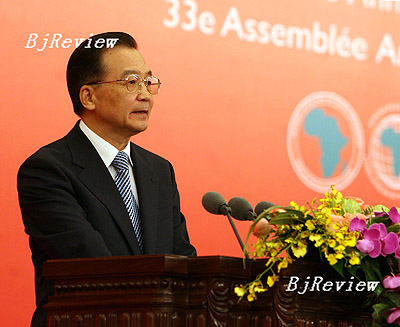
China’s teeming coastal hub of Shanghai has always attracted its share of people from the African continent. However, this May, in an unprecedented event, high officials and financial experts from all 53 African countries converged on the International Convention Center, under Shanghai’s pride, the Oriental Pearl Tower, for a meeting widely considered a monumental boost for Sino-African relations.
The gathering-the 42nd annual meeting of the Board of Governors of the African Development Bank Group (AfDB)-boasted senior finance officials, development policymakers and various experts from the 53 African countries, as well as 24 non-regional members of the organization. The theme of the conference, “Africa and Asia, Partners in Development,” illuminated the importance attached by the AfDB to the blossoming relationship between the two continents.
“It is a great honor that the AfDB has chosen China in which to hold its annual meeting, and this will greatly promote Sino-African financial cooperation,” said Zhou Xiaochuan, Governor of the People’s Bank of China (PBC), China’s central bank, also one of the hosts of the meeting.
Several days ahead of the meeting (May 16-17), a series of conferences and symposiums were held to discuss issues of cooperation between Asia and Africa. According to Zhou, the meeting provided a valuable opportunity for African banks, enterprises and governments to closely understand China and exchange views and experiences with their Chinese counterparts. This, he said, would solidify a platform for pragmatic and active cooperation between Chinese and African financial institutions.
Zhou’s remarks were echoed by Donald Kaberuka, President of AfDB. “The financial sector is an important field for cooperation between China and Africa,” said the Rwandan, AfDB President since 2005.
This is the second Africa-related convention held by China, after the Beijing Summit of the Forum on China-Africa Cooperation (FOCAC) in November 2006. China also became the second non-African country to host the company’s annual meetings, after Spain in 2001.
Founded in 1964 and established with a view to overcoming Africa’s enormous development financing challenges in the post-independence era, AfDB is now one of the world’s five largest multilateral development banks, together with the World Bank, the Asian Development Bank, the Inter-American Development Bank and the European Development Bank. In 1982, AfDB opened its membership to non-regional countries, and China joined the group in 1985. China is now also a member of the West African Development Bank; moreover, China Development Bank has signed framework cooperative agreements with the East African Development Bank, and the Eastern and Southern African Trade and Development Bank. “With the deepening of Sino-African financial exchanges and cooperation, more and more Chinese and African enterprises will enter one another’s markets,” said Zhou.
Fresh impetus for cooperation
“China-Africa cooperation methods should emphasize technology- and talent-training to help African countries strengthen their ability to develop independently,” said Chinese Premier Wen Jiabao on May 16, at the opening ceremony of the annual meeting. Wen’s suggestion was exemplified by the recent event of a satellite-launching program between China and Nigeria. On the morning of May 14, China successfully launched a communications satellite for Nigeria, the first of its kind in Africa and the first time a foreign buyer has purchased a Chinese satellite and its launching service.
“Compared with European countries and the United States, China’s satellite technology may not be the most advanced, but it is the most suitable for African countries. China reduced Africa’s cost for satellite telecommunications and trained large numbers of scientific and technological talents for us,” said Bode Augusto, Director General of the Budget Office of the Presidency of Nigeria.
The Chinese Government, said Zhou, encourages Chinese enterprises-especially small and medium-sized enterprises-to increase their investments in Africa. He noted that with the increase in China’s capital accumulations and foreign exchange reserves, China’s non-governmental investments in Africa would rise proportionately.
By the end of 2006, China’s investments in Africa totaled $11.7 billion, including $6.64 billion of direct investments from various enterprises. Meanwhile, China has also helped launch nearly 900 projects for Africa in the past 50 years. According to the commitment made by Chinese President Hu Jintao at the Beijing Summit of FOCAC, in the next three years, China will help African nations build 30 hospitals, 100 rural schools, 30 anti-malaria centers and 10 special agricultural technology demonstration centers. During his trip to eight African countries early this year, Hu participated in the opening ceremonies of the first anti-malaria center in Liberia and the first special agricultural technology demonstration center in Mozambique.
“Enterprises have become the main part of China’s investment in Africa and both sides can gain benefits from this cooperation mode. This represents a new type of strategic partnership between China and Africa in the new era,” said Shu Yunguo, Director of the African Studies Center of Shanghai Normal University.
“Against the backdrop of economic globalization, Africa is closely connected with China,” said Marc Ravalomanana, the President of Madagascar, adding that Africa possesses abundant natural resources. “This supplies preconditions for further cooperation between China and Africa.” Ravalomanana, who also attended the Beijing Summit of FOCAC, stated that many African countries, including Madagascar, are improving their economic situation rapidly, and China’s developing experience is very important for them. In recent years, the annual economic growth of Madagascar has hit 5 percent, and this is expected to rise a further 2 percentage points this year.
|
